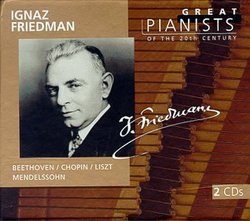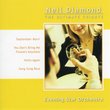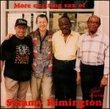| All Artists: Ignaz Friedman, Chopin, Liszt, Mendelssohn Title: Great Pianists (series) - Ignaz Friedman plays Beethoven, Chopin, Hummel, Mendelssohn, etc. Members Wishing: 2 Total Copies: 0 Label: Philips Release Date: 6/1/1999 Genres: Dance & Electronic, Classical Styles: Chamber Music, Forms & Genres, Ballads, Fantasies, Sonatas, Historical Periods, Classical (c.1770-1830), Modern, 20th, & 21st Century, Romantic (c.1820-1910) Number of Discs: 2 SwapaCD Credits: 2 UPC: 028945678429 |
Search - Ignaz Friedman, Chopin, Liszt :: Great Pianists (series) - Ignaz Friedman plays Beethoven, Chopin, Hummel, Mendelssohn, etc.
 | Ignaz Friedman, Chopin, Liszt Great Pianists (series) - Ignaz Friedman plays Beethoven, Chopin, Hummel, Mendelssohn, etc. Genres: Dance & Electronic, Classical
|
Larger Image |
CD DetailsSimilar CDs
|
CD ReviewsRomantic Pianism Robin Friedman | Washington, D.C. United States | 01/28/2004 (5 out of 5 stars) "Ignaz Friedman (1882-1948)studied the piano with Theodore Leschitzy and gave over 3000 concerts in Europe, North and South America, and Australia in a long performing career. His recorded legacy is, alas, small; but much of it is included on this two-CD set which is part of an outstanding series called "Great Pianists of the 20th Century". The disc includes informative and balanced liner notes and a short biography of the artist. Friedman richly deserves to be included among the great pianists. The recordings on this compiliation date from 1923--1936.Friedman had a virtuoso, powerhouse technique and a romantic playing style. He played with a great sense of rhythmic freedom and individuality. Notoriously, he did not always follow strictly the notes in the score but improvised and added. His style was controversial then and, more so, today. I recently read a review of a variety of Chopin recordings which criticized Friedman's rendition of Chopin's "heroic" polonaise, opus 53, included in this collection, as mostly empty thumping. I listened and listened again to the recording and couldn't bring myself to agree.This set includes a great variety of Chopin but none of the complete sets (say complete mazurkas, nocturnes) common in modern recordings. The sound as as good as can be expected given the age of the pressings, but undoubtedly much of Friedman's beauty of tone fails to come through. The highlight of the collection is the recording of 12 Chopin mazurkas with Friedman's intensity, rhythmic idiosyncracy, and sense of melancholy which pervades most of these pieces. They are a beautiful introduction to Chopin.I also enjoyed the selection of 5 Chopin etudes, particularly the devilish "study in thirds", opus 25 no. 6 which captures Friedman's masterly technique. The Berceuse, opus 57 with its fluttering thirds, and the two movements presented here of Chopin's second piano sonata, opus 35 also are fine performances and show Friedman at his best.The other major highlight of this disc for me was Friedman's performance of 9 of Mendelsson's "Songs without Words". This music is frequently underestimated. Friedman takes these pieces seriously and performs them with thought and individuality, making it difficult to conceive of these pieces as mere parlor-music.The disc also includes several works that are infrequently heard today. I enjoyed the piano rendition of Weber's "Invitation to the Dance" which is heard most often nowadays in orchestral transcription. The short pieces by Anton Rubenstein and Hummel were also unfamiliar to me and idiomatically played.The only large-scale work performed in full on this disc is Beethoven's "Moonlight" sonata, opus 27 no. 2. Friedman takes the first movement very slowly and the second movement somewhat ponderously. The third movement is all speed and lightening, with the long prestissimo passages blurred in some cases. Friedman was a virtuoso performer who played in a romantic style that was greatly influential two or three generations ago but is mostly out of fashion today. But it is still a beautiful way to make music. The listener unfamiliar with this music will be moved by it and by Friedman's pianism. Listeners who know and love the piano will enjoy this great performer of the past." Worth it for the mazurkas JQR | Chapel Hill, N.C. | 07/17/2001 (4 out of 5 stars) "It is interesting to see how widely opinion on Friedman's interpretations varies! The liner notes to this 2CD set address this point, and a reading of the few user comments here attests to the fact as well. These are unique interpretations, which do occasionally--far less than one reviewer below indicates, I would certainly argue--take liberties with the score. Chopin wrote these pieces as interpretations of his native Poland's folk dances, and in listening to the great interpreters, particularly Rubinstein (through the years) one can only conclude, after study, that spontaneity is a large part of what the composer was attempting to capture in these little gems, and that studied, classically-true, concert hall performance doesn't really do these pieces justice. As a jazz pianist myself, I admit partiality to freer interpretation of folk-music-derived melody, but I am also a product of classical training, and appreciate the importance of adherence to the composer's line. The preludes--there, I will take Rubinstein. Still, given all this, I truly encourage any admirer of Chopin's music to hear what Friedman does. Even given the rough mono sound of these early recordings, you can hear the sheer joy this man finds in these pieces--it is an impulsive, happy naturalness which, I think, is quite rare in the whole of recorded music. I can't say nearly as much about the Beethoven or other couplings, but this Chopin is magical stuff. Not totally by the book. But what art. Don't miss it." The No.1 in Moiseiwitsch's Eyes BLee | HK | 05/13/2003 (5 out of 5 stars) "I have just gone back to some of the historic recordings in particular Horszowski, Hofmann, Rachmaninoff, Rosenthal and Friedman and some others. Rosenthal was simply too old when he made his first record ( Pupils of Liszt contains excellent transfer of his); and Horszowski or even Moiseiwitsch are not quite as interesting as the other three. Hofmann's superb legato touch is stunning ( only Sauer's Blue Danube was any better): piano in his hands sounds like a small but extremely refined orchestra. Some, including Rachmaninoff, ranked him the No.1 pianist of the century. Rachmaninoff as a pianist on the other hand lacked Hofmann's glamour, but he was armed with the depth and insight of a composer, the so-called "a heart of gold", something which he compared favourably with Hofmann.But Friedman had got the strong points of both of them. Like Hofmann, he was a child prodigy who was later landed with a Degree from Leizig University in Composition, Philosophy and Esthetics. He soon become a pupil of and later the assistant of Leschetisky. He had composed over 100 works and had made extensive scholarly editions of music scores! And above all, he was also an enormously successful performer since his early 20's-- with a success much bigger than Horowitz. If one ever finds Schnabel ( his fellow Leschetiskian ) interesting or musically illuminating, do not miss out Friedman: Schnabel's playing tells you WHAT IS MUSIC, but Friedman's tells you WHAT MUSIC IS! What Friedman undertook and succeeded in doing was most challenging: he didn't just capture life but recreated it in his music. (Cortot did that too but only in a different way.) This involves a lot of originality and imagination. His rhythm is full of life. (Cortot's was instead full of dreams and adventures!) His Mazurkas well illustrated this point: the beats are organized in accordance with the movements of the dancers, not with the metronome. The balance of both his hands are so subtle and again so full of life. Pedal was so sparingly and carefully used... Needless to say, other pieces including his own are equally interesting. There is so much drama in his music, more than either Hofmann or Rachmaninoff. The rhythm,the skeleton of music is astoundingly under control and the colour, the so called flesh and blood of music, is amazingly beyond the imagination of Horowitz on whom his influence was quite strong. ( But Horowitz simply lacked one whole dimension! ) He had a technique even more colossal than Rachmaninoff: his repertoire is virtually limitless, and he could play, especially his left hand, as daring as Cziffra plus Rachmaninoff's depth and above all, with more colours! It's as if his ten fingers are literally independent, each capble of creating a different timbre, a different rhythm and yet the whole thing is as subtle and breathing as if with life. Yes, you can really feel the breath and pulses of his music: a four-dimensional playing something which so far on record ONLY a few like D'albert, De Greef and Erno Dohnanyi were capble of ( but the colour of the latters are not so well captured ). And he played music more from a performer's ( like Horowitz ) rather than from a composer's point of view like Rachmaninoff. That helps to explain why Friedman's playing is so fresh and exciting and why Moiseiwitsch ranked him the No.1."
|

 Track Listings (23) - Disc #1
Track Listings (23) - Disc #1


